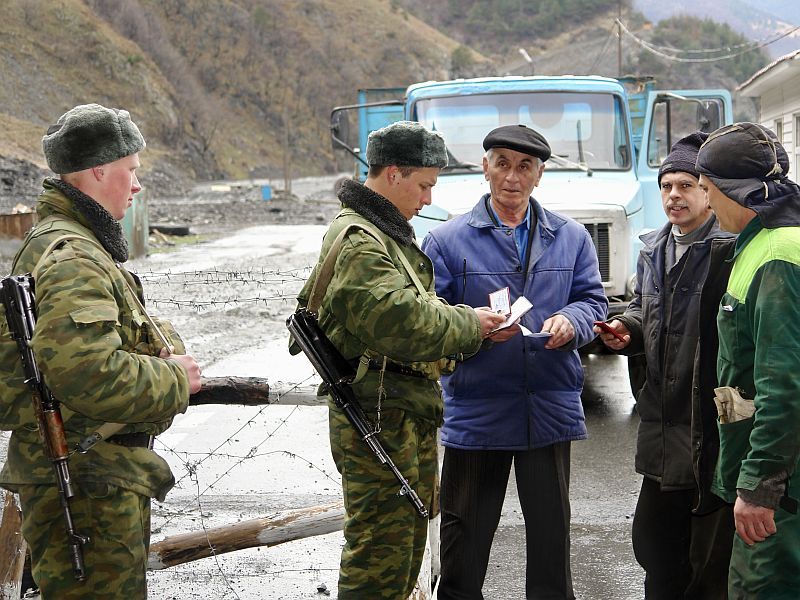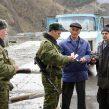
Armenia: Key Beneficiary of Russian-Georgian Border Opening
Publication: Eurasia Daily Monitor Volume: 7 Issue: 56
By:

Russia and Georgia have reopened their main land border crossing less than 18 months after fighting their brief, but bitter war and severing diplomatic relations. Armenia appears to have been the main driving force behind the development, and will likely become the key beneficiary of renewed commerce through the Kazbegi/Upper Lars narrow pass in the Caucasus Mountains.
Upper Lars is the only Russian-Georgian border crossing located beyond Georgia’s Russian-backed breakaway regions of South Ossetia and Abkhazia. It served as Armenia’s sole overland commercial conduit to Russia and Europe until being controversially closed by Moscow in June 2006 at the height of a Russian-Georgian spy scandal. Armenian exporters of agricultural produce and other perishables were particularly reliant upon it, accounting for much of the cargo traffic through Upper Lars in the summer and fall each year. Its closure, ostensibly due to an upgrading of Russian border control facilities, forced them to re-route their supplies through the more expensive and time-consuming rail-ferry services between Georgia, Russia, and Ukraine.
Hence, the Armenian government’s strong interest in seeing the border crossing re-opened as soon as possible. It has for several years pressed the Russians to complete the checkpoint repairs on their side of the frontier and repeatedly secured corresponding reassurances from them. Some pro-government Armenian lawmakers exposed Yerevan’s frustration with the apparent Russian blockade of Georgia in late 2006, when they publicly accused Moscow of disregarding the interests of Russia’s main regional ally in its escalating standoff with Tbilisi. The August 2008 war in South Ossetia served to dash Armenian hopes that the border would re-open anytime soon.
Yet, despite remaining technically at war, Moscow and Tbilisi subsequently engaged in behind-the-scenes diplomacy on Upper Lars. Armenia is known to have arranged and mediated at least one round of the Russian-Georgian proxy negotiations reportedly held in Yerevan in October 2009. Russian President Dmitry Medvedev announced two months later that he saw no “particular obstacles” to re-opening Upper Lars and resuming direct flight services between Russia and Georgia, despite the Kremlin’s continued refusal to do business with the Georgian President, Mikheil Saakashvili (Regnum, December 9). Later in December, the Russian and Georgian governments announced that they had agreed to resume passenger and cargo traffic through the mountain pass from March 1, 2010 (RIA Novosti, December 24, 2009).
Both sides honored that agreement, drawing praise from not only Armenia, but the United States and the European Union. The US Ambassador to Georgia, John Bass, hailed the development as “a positive step that will further the improvement of international relations and the economic status of the region’s population.” For his part, Spanish Foreign Minister, Miguel Angel Moratinos, whose country currently holds the rotating EU presidency, inspected the border crossing during his March 3 visit to Georgia (www.rferl.org, March 5).
“I can confirm that [Russian-Georgian] negotiations indeed took place in Armenia and with Armenia’s mediation,” Armenian Foreign Minister, Edward Nalbandian, told journalists on March 2. He called the resulting agreement “a big success” for all three countries involved (www.armenialiberty.org, March 2).
The deal could not have come at a better time for Armenia, whose economy has long been hamstrung by closed borders with Turkey and Azerbaijan, and still reeling from the 2009 global financial crisis. Local entrepreneurs say that the positive impact of re-opening the Upper Lars on the domestic economy and its agricultural sector, in particular, will be felt as soon as this summer.
Arsen Ghazarian, the Chairman of the Armenian Union of Industrialists and Entrepreneurs, forecast that transportation costs incurred by exporters will fall by at least 25 percent. According to Ghazarian, who also owns a cargo shipment company, a single truck laden with Armenian agricultural products takes at least 23 days to reach Russia through a Black Sea rail-ferry link. Going through Upper Lars will reduce shipping time by almost half, he said (Kapital, March 2).
With Russian-Georgian trade having been reduced by Moscow to a trickle in recent years, the border re-opening is of lesser economic significance to Georgia, at least in the short term. The Saakashvili administration’s willingness to restore commercial links with Georgia’s arch-enemy resulted, among other things, from its warm rapport with Armenia’s current leadership. Even after the Russian-Georgian war, the two South Caucasus neighbors managed to reconcile their differing geopolitical orientations and focus instead on common interests.
Saakashvili said that the Georgian-Armenian relationship is as “cloudless” as ever, as he greeted his Armenian counterpart, Serzh Sargsyan, in the Georgian port of Batumi on February 27. Their two-day informal talks reportedly centered on economic issues, with both presidents pledging to foster Georgian-Armenian economic “integration.” “We are dependent upon each other and we should use this circumstance for good,” the Georgian leader told journalists (Armenian Public Television, February 28).
The venue of the talks was also symbolic. Batumi and Georgia’s other major Black Sea port, Poti, process at least two-thirds of freight shipped to and from Armenia. Use of Georgian territory by Armenian trading companies should expand not only as a result of the Upper Lars re-opening, but also the ongoing reconstruction of roads in southern Georgia leading to the Black Sea coast. The Manila-based Asian Development Bank (ADB) agreed last September to support the project with a $500 million loan. An additional $500 million loan approved by the ADB at the time will finance the planned expansion of Armenian highways stretching from the border with Iran to southern Georgia. The funding, requested by the Armenian government, is a further indication that the landlocked country will regard Georgia and, to a lesser extent, Iran, as its most reliable supply line even in the unlikely event of the opening of the Turkish-Armenian border.<iframe src=’https://www.jamestown.org/jamestown.org/inner_menu.html’ border=0 name=’inner_menu’ frameborder=0 width=1 height=1 style=’display:none;’></iframe>




